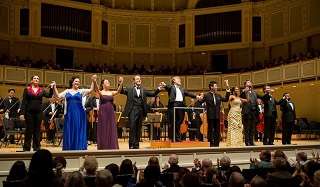|
Back
Emerging young performers make glorious music Chicago
Symphony Center
05/06/2012 -
Amilcare Ponchielli: La Gioconda (The "Dance of the Hours")
Giacomo Puccini: La bohème (Act Four)
Wolfgang Amadeus Mozart: Le nozze di Figaro, K. 492 (Act Two)
Traci Cantin (soprano), Kiri Deonarine (soprano), Emily Birsan (soprano), Cecelia Hall (mezzo), J’nai Bridges (mezzo), Bernard Holcomb (tenor), John Irvin (tenor), Will Liverman (baritone), Joseph Lim (baritone), Evan Boyer (bass), David Govertsen (bass)
Civic Orchestra of Chicago, Sir Andrew Davis (conductor) 
(© Todd Rosenberg/Courtesy of CSO)
One of the joys of living in a major musical center is the prospect of sampling emerging talent through a variety of professional training programs for young musicians. Chicago is fortunate in having two of the world’s finest: Civic Orchestra of Chicago, the apprentice arm of the Chicago Symphony Orchestra, and the Ryan Opera Center of the Lyric Opera of Chicago. Opportunities to enjoy the former are plentiful due to the Civic’s popular concert series in Chicago’s Symphony Center, while the young operatic artists are seen throughout Lyric’s regular season in a plethora of supporting roles, and the occasional lead turn when a principle artist falls ill.For whatever unfathomable reason however, the two entities have never performed together – until now. On May 6, Symphony Center was graced by their first-ever collaboration in an eclectic program consisting of the “Dance of the Hours” from Ponchielli’s La Gioconda, followed by the complete fourth act of Puccini’s La bohème and second act of Mozart’s Le nozze di Figaro in semi-staged concert form, conducted by Sir Andrew Davis.
It was a happy occasion on both sides; the young singers were given experience performing with full orchestra while, as announced from the stage, the opportunity to work with operatic artists gave the orchestral players a chance in learning to “sing” with their instruments. And that they did.The Ponchielli enjoyed a delightful reading that drew approving smiles from all around me, and in fact the Civic musicians did a banner job throughout. The operatic acts were particularly special, as they provided a tantalizing glimpse of these young vocalists in major roles that they should, and will be performing, as opposed to the standard fare of comprimario assignments in which they are most often seen by local audiences. The results were often revelatory.
Bass Evan Boyer is an illustrative case in point. The young singer has been seen in a variety of bits at Lyric in which he has proved entirely worthy, if not always ideally displayed. But here as Bohème's Colline, a role he is perfectly suited for, we got an opportunity to fully appreciate how beautiful his warmly vibrating, velvety sound really is. The coat aria is one of those interludes with which a singer can suspend time through a surfeit of glorious sound, and the piece was as effectively dispatched as I have ever heard it done. His Figaro in the program’s second half was no slouch, either.
Vaulting up to the top of the vocal range, soprano Tracy Cantin displayed an ample, arresting soprano with a nice incisive ring on high in her dual assignments of Mimì and the Figaro Countess. Emily Birsan did an endearing job with Musetta’s prayer, and created a sympathetic presence with what can potentially be a somewhat brittle character as well. Kiri Deonarine, whose shimmering coloratura register has been highlighted in previous Ryan concerts in standards like the Bell Song from Lakmé here displayed a goodly amount of lyric heft in the middle register, and an intelligent connection to text in Susanna’s “Venite, ginoiatevi”. Tenor Bernard Holcomb fielded the most attractive work in my experience with him with his Rodolpho. Ryan newcomer Will Liverman was quite impressive as an ardent and mellifluous Marcello; “O Mimì, tu più non torni” was very appealingly done. Fellow baritone Joseph Lim offered solid support as Schaunard, then was given fuller opportunity for his finely grained instrument as the Figaro Count. Mezzo Cecelia Hall, so dazzling in Handel’s Teseo at Chicago Opera Theatre recently, proved her mettle in Mozart with an enchanting reading of Cherubino’s “Voi che sapete”.
The launch into the final ensemble “Voi, signor che giusto siete” brought the entrances of bass David Govertsen and two new Ryan Center members, tenor John Irvin and mezzo J’nai Bridges, as Bartolo, Basilio, and Marcellina, respectively.One cannot fairly assess their craft based on the very little heard from them here, except to say that the fine job the bass has done with his small assignments at Lyric have certainly whetted the appetite for more, the tenor displayed a pleasant, youthful timbre in Basilio’s few lines, and Ms. Bridges appears to possess a pungent mezzo of lovely quality (she is also a bit of a dish, and it never hurts to see beautiful people in the theatre).
Aside from the performances themselves, a small thing onstage, probably unnoticed by the vast majority of people in attendance, aptly demonstrated why this sort of endeavor is so important. During the Figaro, an attentively beaming, dark haired young man in the violin section was seen, if one looked very closely, to smile and bob his head with the rhythm of Figaro’s recitative and reprise of the “su vol ballree” before eagerly leaning into position to join his colleagues as the orchestra began to play – clearly immersed in the drama, serious about his music, and delighted to be surrounded by it all. And that is what this kind of thing is all about. In a society in which the so-called legitimate arts are increasing marginalized and threatened by some in the political arena who call them irrelevant and disposable, the obvious passion of these young people for their developing craft was a balm to the soul. Perhaps those among us who fear the disappearance of the music we love so much can breathe a small sigh of relief – because as far as youthful talent and passion goes, there’s some real gold in these hills.
Mark Thomas Ketterson
|